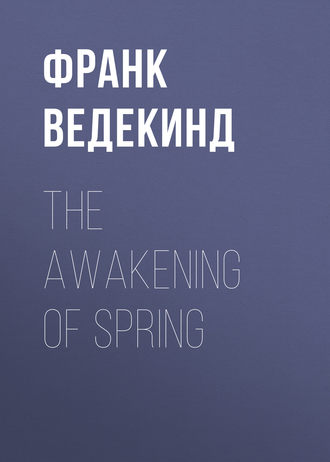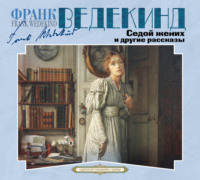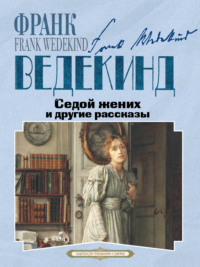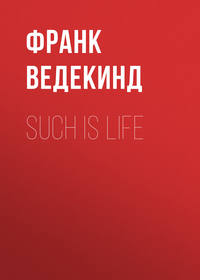 полная версия
полная версияThe Awakening of Spring
May I roll you a cigarette?
MoritzThanks, I don't smoke.–If it only keeps on this way! I will work and work until my eyes fall out of my head.–Ernest Röbel has failed three times since vacation; three times in Greek, twice with Knochenbruch; the last time in the history of literature. I have been first five times in this lamentable conflict, and from to-day it does not bother me!–Röbel will not shoot himself. Röbel has no parents who sacrifice everything for him. If he wants he can become a soldier, a cowboy or a sailor. If I fail, my father will feel the blow and Mamma will land in the madhouse. One can't live through a thing like that!–Before the examination I begged God to give me consumption that the cup might pass me by untouched. He passed me by, though to-day His aureole shines in the distance, so that I dare not lift my eyes by night or day.–Now that I have grasped the bar I shall swing up on it. The natural consequence will be that I shall break my neck if I fall.
MelchiorLife is a worthless commonplace. It wouldn't have been a bad idea if I had hanged myself in the cradle.–Why doesn't Mamma come with the tea!
MoritzYour tea will do me good, Melchior!–I'm shivering. I feel so strangely spiritualized. Touch me once, please. I see,—I hear,—I feel, much more acutely–and yet everything seems like a dream–oh, so harmonious.–How still the garden stretches out there in the moonlight, so still, so deep, as if it extended to eternity. From out the bushes step indefinable figures that slip away in breathless officiousness through the clearings and then vanish in the twilight. It seems to me as if a counsel were to be held under the chestnut tree.–Shall we go down there, Melchior?
MelchiorLet's wait until we have drunk our tea.
MoritzThe leaves whisper so busily.–It's just as if I heard my dead grandmother telling me the story of the “Queen Without a Head.” There was once a wonderfully beautiful Queen, beautiful as the sun, more beautiful than all the maidens in the country. Only, unfortunately, she came into the world without a head. She could not eat, not drink, not kiss. She could only communicate with her courtiers by using her soft little hand. With her dainty feet she stamped declarations of war and orders for executions. Then, one day, she was besieged by a King, who, by chance, had two heads, which, year in and year out, disputed with one another so violently that neither could get a word in edgewise. The Court Conjurer-in-chief took off the smallest of these heads and set it upon the Queen's body. And, behold, it became her extraordinarily well! Therefore, the King and the Queen were married, and the two heads disputed no longer, but kissed each other upon the brow, the cheeks and the mouth, and lived thereafter through long, long years of joy and peace.–Delectable nonsense! Since vacation I can't get the headless Queen out of my mind. When I see a pretty girl, I see her without a head–and then presently, I, myself appear to be the headless Queen.–It is possible that someone may be set over me yet.
(Frau Gabor comes in with the steaming tea, which she sets before Melchior and Moritz on the table.)Frau GaborHere, children, here's a mouthful for you. Good-evening, Herr Stiefel, how are you?
MoritzThank you, Frau Gabor.–I'm watching the dance down there.
Frau GaborBut you don't look very good–don't you feel well?
MoritzIt's not worth mentioning. I went to bed somewhat too late last night.
MelchiorOnly think, he worked all through the night.
Frau GaborYou shouldn't do such things, Herr Stiefel. You ought to take care of yourself. Think of your health. Don't set your school above your health. Take plenty of walks in the fresh air. At your age, that is more important than a correct use of middle high German.
MoritzI will go walking. You are right. One can be industrious while one is taking a walk. Why didn't I think of that myself!–The written work I shall still have to do at home.
MelchiorYou can do your writing here; that will make it easier for both of us.–You know, Mamma, that Max von Trenk has been down with brain fever!–To-day at noon Hans Rilow came from von Trenk's deathbed to announce to Rector Sonnenstich that von Trenk had just died in his presence. “Indeed?” said Sonnenstich, “haven't you two hours from last week to make up? Here is the beadle's report. See that the matter is cleared up once for all! The whole class will attend the burial.”–Hans was struck dumb.
Frau GaborWhat book is that you have, Melchior?
Melchior“Faust.”
Frau GaborHave you read it yet?
MelchiorNot to the end.
MoritzWe're just at the Walpurgisnacht.
Frau GaborIf I were you I should have waited for one or two years.
MelchiorI know of no book, Mamma, in which I have found so much beauty. Why shouldn't I read it?
Frau GaborBecause you can't understand it.
MelchiorYou can't know that, Mamma. I feel very well that I am not yet able to grasp the work in its entirety–
MoritzWe always read together; that helps our understanding wonderfully.
Frau GaborYou are old enough, Melchior, to be able to know what is good and what is bad for you. Do what you think best for yourself. I should be the first to acknowledge your right in this respect, because you have never given me a reason to have to deny you anything. I only want to warn you that even the best can do one harm when one isn't ripe enough in years to receive it properly.–I would rather put my trust in you than in conventional educational methods.–If you need anything, children, you, Melchior, come up and call me. I shall be in my bedroom.
(Exit.)MoritzYour Mamma means the story of Gretchen.
MelchiorWeren't we discussing it just a moment ago!
MoritzFaust himself cannot have deserted her in cold blood!
MelchiorThe masterpiece does not end with this infamous action!–Faust might have promised the maiden marriage, he might have forsaken her afterwards, but in my eyes he would have been not a hair less worthy of punishment. Gretchen might have died of a broken heart for all I care.–One sees how this attracts the eyes continually; one might think that the whole world turned on sex!2
MoritzTo be frank with you, Melchior, I have almost the same feeling since I read your explanation.–It fell at my feet during the first vacation days. I was startled. I fastened the door and flew through the flaming lines as a frightened owl flies through a burning wood–I believe I read most of it with my eyes shut. Your explanation brought up a host of dim recollections, which affected me as a song of his childhood affects a man on his deathbed when heard from the lips of another. I felt the most vehement pity over what you wrote about maidens. I shall never lose that sensation. Believe me, Melchior, to suffer a wrong is sweeter than to do a wrong. To be overcome by such a sweet wrong and still be blameless seems to me the fullness of earthly bliss.
MelchiorI don't want my bliss as alms!
MoritzBut why not?
MelchiorI don't want anything for which I don't have to fight!
MoritzIs it enjoyable then, Melchior?–The maiden's enjoyment is as that of the holy gods. The maiden controls herself, thanks to her self-denial. She keeps herself free from every bitterness until the last moment, in order that she may see the heavens open over her in an instant. The maiden fears hell even at the moment that she perceives a blooming paradise. Her feeling is as pure as a mountain spring. The maiden holds a cup over which no earthly breath has blown as yet; a nectar chalice, the contents of which is spilled when it flames and flares.–The enjoyment that the man finds in that, I think, is insipid and flat.
MelchiorYou can think what you like about it, but keep your thoughts to yourself–I don't like to think about it.
SCENE SECOND
A Dwelling RoomFrau Bergmann(Enters by the center door. Her face is beaming. She is without a hat, wears a mantilla on her head and has a basket on her arm.)Wendla! Wendla!
Wendla(Appears in petticoats and corset in the doorway to the right.)What's the matter, Mother?
Frau BergmannYou are up already, child? Now, that is nice of you!
WendlaYou have been out already?
Frau BergmannGet dressed quickly!–You must go down to Ina's at once. You must take her this basket!
Wendla(Dressing herself during the following conversation.)You have been to Ina's?—How is Ina?—Is she ever going to get better?
Frau BergmannOnly think, Wendla, last night the stork paid her a visit and brought her a little baby boy!
WendlaA little boy?–A little boy!–Oh, that's lovely!–That's the cause of that tedious influenza!
Frau BergmannA fine little boy!
WendlaI must see him, Mother. That makes me an aunt for the third time–aunt to a little girl and two little boys!
Frau BergmannAnd what little boys!–It always happens that way when one lives so near the church roof!–To-morrow will be just two years since she went up the steps in her mull gown.
WendlaWere you there when he brought him?
Frau BergmannHe had just flown away again.–Won't you put on a rose?
WendlaWhy couldn't you have been a little earlier, Mother?
Frau BergmannI almost believe he brought you something, too–a breastpin or something.
WendlaIt's really a shame!
Frau BergmannBut, I tell you, he brought you a breastpin!
WendlaI have breastpins enough–
Frau BergmannThen be happy, child. What do you want besides?
WendlaI would have liked so much to have known whether he flew through the window or down the chimney.
Frau BergmannYou must ask Ina. Ha! You must ask Ina that, dear heart! Ina will tell you that fast enough. Ina talked with him for a whole half hour.
WendlaI will ask Ina when I get there.
Frau BergmannNow don't forget, sweet angel! I'm interested myself to know if he came in through the window or by the chimney.
WendlaOr hadn't I better ask the chimney-sweep?–The chimney-sweep must know best whether he flew down the chimney or not.
Frau BergmannNot the chimney-sweep, child; not the chimney-sweep. What does the chimney-sweep know about the stork! He'd tell you a lot of foolishness he didn't believe himself–Wha–what are you staring at down there in the street?
WendlaA man, Mother,–three times as big as an ox!–with feet like steamboats–!
Frau Bergmann(Rushing to the window.)Impossible! Impossible!
Wendla(At the same time.)He holds a bedslat under his chin and fiddles “Die Wacht am Rhein” on it–there, he's just turned the corner.–
Frau BergmannYou are, and always will be a foolish child!–To frighten your old simple mother that way!–Go get your hat! I wonder when you will understand things. I've given up hope of you.
WendlaSo have I, Mother dear, so have I. It's a sad thing about my understanding.–I have a sister who has been married for two and a half years, I myself have been made an aunt for the third time, and I haven't the least idea how it all comes about.–Don't be cross, Mother dear, don't be cross! Whom in the world should I ask but you! Please tell me, dear Mother! Tell me, dear Mother! I'm ashamed for myself. Please, Mother, speak! Don't scold me for asking you about it. Give me an answer–How does it happen?–How does it all come about?–You cannot really deceive yourself that I, who am fourteen years old, still believe in the stork.
Frau BergmannGood. Lord, child, but you are peculiar!–What ideas you have!–I really can't do that!
WendlaBut why not, Mother?–Why not?–It can't be anything ugly if everybody is delighted over it!
Frau BergmannO–O God protect me!–I deserve–Go get dressed, child, go get dressed!
WendlaI'll go–And suppose your child went and asked the chimney-sweep?
Frau BergmannBut that would be madness!–Come here, child, come here, I'll tell you! I'll tell you everything–O Almighty Goodness!–only not to-day, Wendla!–To-morrow, the next day, next week–any time you want, dear heart–
WendlaTell me to-day, Mother; tell me now! Right away!–Now that I have seen you so frightened I can never be peaceful until you do.
Frau BergmannI can't do it, Wendla.
WendlaOh, why can't you, Mother dear!–I will kneel here at your feet and lay my head in your lap. You can cover my head with your apron and talk and talk, as if you were entirely alone in the room. I won't move, I won't cry, I will bear all patiently, no matter what may come.
Frau BergmannHeaven knows, Wendla, that I am not to blame! Heaven knows it!–Come here in God's name! I will tell you, child, how you came into this world.–Listen to me, Wendla.–
Wendla(Under the apron.)I'm listening.
Frau Bergmann(Extatically.)But it's no use, child!–I can't justify it. I deserve to be put into prison–to have you taken from me.
WendlaTake heart, Mother!
Frau BergmannListen, then–!
Wendla(Trembling under the apron.)O God! O God!
Frau BergmannIn order to have a child–do you understand me, Wendla?
WendlaQuick, Mother, I can't stand it much longer.
Frau BergmannIn order to have a child–one must love—the man—to whom one is married—love him, I tell you—as one can only love a man! One must love him so much with one's whole heart, so—so that one can't describe it! One must love him, Wendla, as you at your age are still unable to love–Now you know it!
Wendla(Getting up.)Great–God–in heaven!
Frau BergmannNow you know what an ordeal awaits you!
WendlaAnd that is all?
Frau BergmannAs true as God helps me!–Take your basket now and go to Ina. You will get chocolate and cakes there.–Come, let's look you over, the laced shoes, the silk gloves, the sailor blouse, the rose in your hair—your dress is really becoming much too short for you, Wendla!
WendlaDid you get meat for lunch, Mother?
Frau BergmannThe Good God protect and bless you–I will find an opportunity to add a handbreadth of flounces to the bottom.
SCENE THIRD
Hans Rilow(With a light in his hand, fastens the door behind him and opens the lid.)“Have you prayed to-night, Desdemona?” (He takes a reproduction of the Venus of Palma Vecchio from his bosom.)–Thou wilt not appear to me after the Our Father, darling,–as in that moment of anticipated bliss when I saw thee contemplatively expectant of someone's coming, lying in Jonathan Schlesinger's shop window–just as enticing as thou art now, with these supple limbs, these softly arched hips, these plump, youthful breasts.–Oh how intoxicated with joy the great master must have been when his glance strayed over the fourteen-year-old original stretched out upon the divan!
Wilt thou not visit me for awhile in my dreams? I will receive thee with widely open arms and will kiss thee until thou art breathless. Thou drawest me onward as the enchanted princess in her deserted castle. Portals and doors open themselves as if by an unseen hand, while the fountain in the park below begins to splash joyously–
“It is the cause!–It is the cause!” The frightful beating in my breast shows thee that I do not murder thee from frivolous emotion. The thought of my lonely nights is strangling me. I swear to thee, child, on my soul, that it is not satiety which rules me. Who could ever boast of being satiated of thee!
But thou suckest the marrow from my bones, thou bendest my back, thou robbest my youthful eyes of their last spark of brilliancy.–Thou art so arrogant toward me in thy inhuman modesty, so galling with thy immovable limbs!–Thou or I! And I have won the victory.
Suppose I count them–all those who sleep, with whom I have fought the same battle here–: Psyche by Thumann—another bequest from the spindle-shanked Mademoiselle Angelique, that rattlesnake in the paradise of my childhood; Io by Corregio; Galathea by Lossow; then a Cupid by Bouguereau; Ada by J. van Beers—that Ada whom I had to abduct from a secret drawer in Papa's secretary in order to incorporate in my harem; a trembling, modest Leda by Makart, whom I found by chance among my brother's college books–seven, thou blooming candidate for death, have preceded thee upon this path to Tartarus. Let that be a consolation unto thee, and seek not to increase my torments at this enormity by that fleeting look.
Thou diest not for thy sins, thou diest on account of mine!–As protection against myself I go to my seventh wife-murder with a bleeding heart. There is something tragic in the rôle of Bluebeard. I believe the combined sufferings of his murdered wives did not equal the torments he underwent each time he strangled one of them.
But my thoughts will become more peaceful, my body will strengthen itself, when thou, thou little devil, residest no longer in the red satin padding of my jewel case. In place of thee, I will indulge in wanton joyousness with Bodenhausen's Lurlei or Linger's Forsaken One, or Defregger's Loni—so I should be all the quicker! But a quarter of a year more, perhaps thy unveiled charms, sweet soul, would begin to consume my poor head as the sun does a pat of butter. It is high time to declare the divorce from bed and board.
Brrr! I feel a Heliogablus within me? Moritura me salutat! Maiden, maiden, why dost thou press thy knees together?–Why now of all times?–In face of the inscrutable eternity?–A movement and I will spare thy life!–A womanly emotion, a sign of passion, of sympathy, maiden!–I will frame thee in gold, and hang thee over my bed! Doest thou not guess that only thy chastity begets my debauchery?–Woe, woe, unto the inhuman ones!–
One always perceives that they received an exemplary education–It is just so with me.
“Have you prayed to-night, Desdemona?”
My heart contracts,–madness!–St. Agnes also died for her reserve and was not half as naked as thou!–Another kiss upon thy blooming body–upon thy childish swelling breast—upon thy sweetly rounded—thy cruel knees–
“It is the cause, it is the cause, my soul, Let me not name it to you, you chaste stars! It is the cause!”–
(The picture falls into the depths, he shuts the lid.)FOURTH SCENE
A haymow. Melchior lies on his back in the fresh hay. Wendla comes up the ladderWendlaHere's where you've hid yourself?–They're all hunting for you. The wagon is outside again. You must help. There's a storm coming up.
MelchiorGo away from me! Go away from me!
WendlaWhat's the matter with you?–Why are you hiding your face?
MelchiorOut! out! I'll throw you down on the floor below.
WendlaNow for certain I'm not going.—(Kneels down by him.) Why won't you come out with me into the meadow, Melchior?–Here it is hot and dark. Suppose we do get wet to the skin, what difference will that make to us!
MelchiorThe hay smells so fine.–The sky outside must be as black as a pall–I only see the brilliant poppy on your breast–and I hear your heart beating–
WendlaDon't kiss me, Melchior!–Don't kiss me!
MelchiorYour heart–I hear beating–
WendlaPeople love–when they kiss–Don't, don't!
MelchiorOh, believe me, there's no such thing as love! Everything is selfishness, everything is egotism!–I love you as little as you love me.
WendlaDon't–don't, Melchior!–
MelchiorWendla!
WendlaOh, Melchior!–Don't, don't–
FIFTH SCENE
Frau Gabor(Sits writing.)Dear Herr Stiefel:—After twenty-four hours of consideration and reconsideration of all you have written me, I take up my pen with a heavy heart. I cannot furnish you with the necessary amount for the voyage to America—I give you my word of honor. In the first place, I have not that much to my credit, and in the second place, if I had, it would be the greatest sin imaginable for me to put into your hands the means of accomplishing such an ill-considered measure. You will be doing me a bitter wrong, Herr Stiefel, if you see a sign of lack of love in my refusal. On the contrary, it would be the greatest neglect of my duty as your motherly friend were I to allow myself to be affected by your temporary lack of determination, so that I also lost my head and blindly followed my first fleeting impulse. I am very ready—in case you desire it—to write to your parents. I should seek to convince your parents that you have done what you could during this quarter, that you have exhausted your strength, that a rigorous judgment of your case would not only be inadvisable, but might be in the greatest degree prejudicial to your mental and bodily health.
That you imply a threat to take your own life in case flight is impossible for you, to speak plainly, has somewhat surprised me. No matter how undeserving is a misfortune, Herr Stiefel, one should never choose improper means to escape it. The way in which you, to whom I have always done only good, want to make me responsible for a possible frightful action on your part, has something about it which, in the eyes of an evil-thinking person, might be misconstrued very easily. I must confess that this outbreak of yours—you who know so well what one owes to oneself—is the last thing for which I was prepared. However, I cherish the strong conviction that you are laboring yet too much under the shock of your first fright to be able to understand completely your action.
And, therefore, I hope with confidence that these words of mine will find you already in better spirits. Take up the matter as it stands. In my opinion it is unwise to judge a young man by his school record. We have too many examples of bad students becoming distinguished men, and, on the other hand, of brilliant students not being at all remarkable in life. At any rate, I can assure you that your misfortune, as far as it lies with me, shall make no difference in your association with Melchior. On the contrary, it will afford me the greatest pleasure to see my son going with a young man who, let the world judge him as it will, is able to win my fullest sympathy.
And, therefore, hold your head high, Herr Stiefel!–Such a crisis as this comes to all of us and will soon be surmounted. If all of us had recourse to dagger or poison in such cases, there would soon be no men left in the world. Let me hear from you right soon again, and accept the heartfelt greetings of your unchanged
Motherly friend,Fanny G.SCENE SIXTH
Bergmann's garden in the morning sunlightWendlaWhy have you slipped out of the room?–To hunt violets!–Because Mother seems to laugh at me.–Why can't you bring your lips together any more?–I don't know.–Indeed I don't know, I can't find words–The path is like a velvet carpet, no pebbles, no thorns.–My feet don't touch the ground.–Oh, how I slept last night!
Here they are.–I become as grave as a nun at communion.–Sweet violets!–Peace, little mother, I will put on my long dress.–Oh God, if somebody would come upon whose neck I could fall and tell!
SCENE SEVEN
Evening twilight. Light clouds in the sky. The path straggles through low bushes and coarse grass. The flow of the stream is heard in the distance.
MoritzBetter and better.–I am not fit. Another may be able to climb to the top. I pull the door to behind me and step into the open.–I don't care enough about it to let myself be turned back.
I haven't succeeded in forcing my way. How shall I force my way now!–I have no contract with God. Let them make out of the thing what they will. I have been forced.–I do not hold my parents answerable. At the same time, the worst must fall upon them. They were old enough to know what they were doing. I was a weakling when I came into the world–or else I would have been wise enough to become another being. Why should I be forced to pay for the fact that the others were here already!
I must have fallen on my head–If anybody makes me a present of a mad dog I'll give him back a mad dog. And if he won't take back his mad dog, then I am human and–
I must have fallen on my head!
Man is born by chance and should not, after mature consideration–It is to shoot oneself dead!
The weather at least has shown itself considerate. The whole day it looked like rain and yet it has held off.–A rare peace rules in nature. Nowhere anything dazzling, exciting. Heaven and earth are like a transparent fabric. And everything seems so happy. The landscape is as sweet as the melody of a lullaby.–“Sleep, little prince, sleep on,” as Fräulein Snandulia sang. It's a shame she holds her elbows so awkwardly!–I danced for the last time at the Cäcilienfest. Snandulia only dances with good matches.–Her silk dress was cut low in front and in the back. In the back, down to her girdle and in the front down–unconscionably low.–She couldn't have worn a chemise.–That might be something able to affect me yet.–More than half curiosity.–It must be a wonderful sensation–a feeling as if one were being carried through the rapids–I should never tell anybody that I was experiencing something untried before–I would act as if I had done it all.—There is something shameful in growing up to be a man without having learned the chief function of masculinity.–You come from Egypt, honorable sir, and have not seen the pyramids?!





